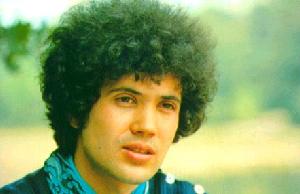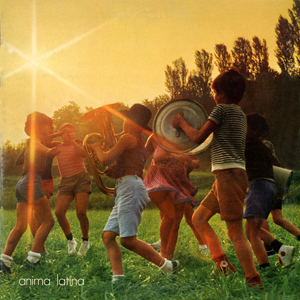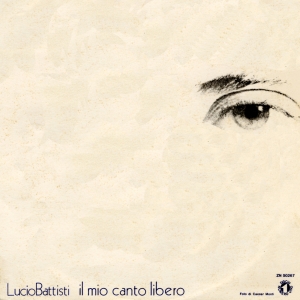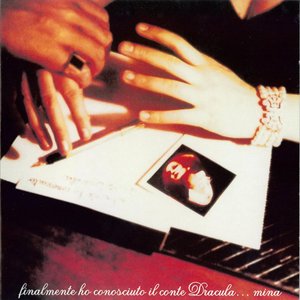
Mina Anna Mazzini or Mina Anna Quaini, known mononymously as Mina, is an Italian singer and actress. She was a staple of television variety shows and a dominant figure in Italian pop music from the 1960s to the mid-1970s, known for her three-octave vocal range, the agility of her soprano voice, and her image as an emancipated woman.

Lucio Battisti was an Italian singer-songwriter and composer. He is widely recognized for songs that defined the late 1960s and 1970s era of Italian songwriting.

Premiata Forneria Marconi (PFM) is an Italian progressive rock band founded in 1970 which continues to the present day. They were the first Italian group to have success internationally. The group recorded five albums with English lyrics between 1973 and 1977. During this period they entered both the British and American charts. They also had several successful European and American tours, playing at the popular Reading Festival in England and on The Midnight Special, a popular national television program in the United States.

Nomadi is an Italian band formed in 1963 and still present on the music scene.

Giulio Rapetti, best known as Mogol, is an Italian music lyricist. He is best known for his collaborations with Lucio Battisti, Gianni Bella, Marcella Bella, Adriano Celentano and Mango.

Giuseppe Mango, better known as Mango or by the diminutive of Pino Mango, was an Italian singer-songwriter and musician. He was known for his style which fuses pop, rock, folk, world music and for his extensive vocal range. He is best known for the song "Oro", from his 1986 breakout album release Odissea. Other hits include "Lei verrà", "Mediterraneo", "Bella d'estate", "Amore per te", "Come Monnalisa", "Nella mia città" and "La rondine".

Anima latina is the ninth studio album by the Italian singer-songwriter Lucio Battisti. It was released in December 1974 by Numero Uno. The album was arranged and produced by the lyricist Mogol and Battisti in its entirety, with performances by various semi-unknown musicians. It is considered one of Battisti's masterpieces for signaling a significant departure from his previous records. Anima latina was Italy's eighth best-selling album of 1975.

Amore e non amore is a concept album by the Italian singer and songwriter Lucio Battisti, and the fourth studio album overall. It was released in July 1971 by Dischi Ricordi.

Mara Maionchi is an Italian record producer and television personality.

Loretta Goggi is an Italian singer, actress, and television presenter. Goggi's records have sometimes entered the Italian pop charts. She was the first runner-up at the 1981 Sanremo Festival with the song "Maledetta primavera", her most famous pop hit.
Carlo Donida Labati was an Italian composer and pianist.

"Il mio canto libero" is a song written by Italian singer-songwriter Lucio Battisti and lyricist Mogol. The song was recorded by Battisti for the album of the same title, and released as a single in November 1972 for Mogol's recording label Numero Uno. The song was a commercial success in Italy, topping the Musica e dischi singles chart for nine consecutive weeks in 1973 and becoming the third best-selling single of the year. During the following years, it was covered by several artists, and it became a classic of Italian popular music. It was certified double platinum by the Federation of the Italian Music Industry in 2024, for domestic equivalent sales exceeding 200,000 units since 2009.

Lucio Battisti Vol. 2 is the second studio album by the Italian singer-songwriter Lucio Battisti. It was released in July 1970 by Dischi Ricordi.

I Camaleonti are an Italian pop group from Milan, mostly successful between the late 1960s and the early 1970s.

Alberto Radius was an Italian guitarist, singer-songwriter, arranger, and record producer. Besides his solo career, he is well-known as a member of the group Formula 3 and for his collaboration with prominent artists such as Lucio Battisti and Franco Battiato.

Antonio "Tony" Cicco, also known as Cico and Toni Cicco, is an Italian drummer and singer-songwriter. He is best known as the vocalist and drummer of the group Formula 3.

Finalmente ho conosciuto il conte Dracula... is a double studio album by Italian singer Mina, released in October 1985 by PDU and distributed by EMI Italiana.

Dik Dik is an Italian beat/pop-rock band, named after the antelope Dik-dik, formed in the 1960s and still active. They were most popular in the late 1960s, when they released a string of hit singles with the contribution of renowned lyric-writer Mogol and songwriter Lucio Battisti, their greatest successes being "Sognando la California" and "Senza luce", respectively covers of "California Dreamin'" by the Mamas and Papas and "A Whiter Shade of Pale" by Procol Harum. While their early production is mostly inspired by the Beatles, in the 1970s they also experimented in other genres, including progressive rock. They went on hiatus in the 1980s but later returned to the scene, mostly in revival television shows and live performances.

This Is Elodie is the third studio album by Italian singer Elodie, released by Island Records on 31 January 2020. It features collaborations with Gemitaiz, Marracash, Fabri Fibra, Margherita Vicario, Ernia, Michele Bravi, Gué Pequeno, Ghemon and The Kolors.

Del mio meglio is a series of compilation albums by the Italian singer Mina, released from 1971 to 1987. Each of them is an anthology of Mina's hits and significant songs taken from her official albums. Also, songs not previously released on albums appeared in such collections for the first time. Each compilation was reissued in different years on different media: vinyl, Stereo8, cassette and compact disc. Various box sets were also released.



















